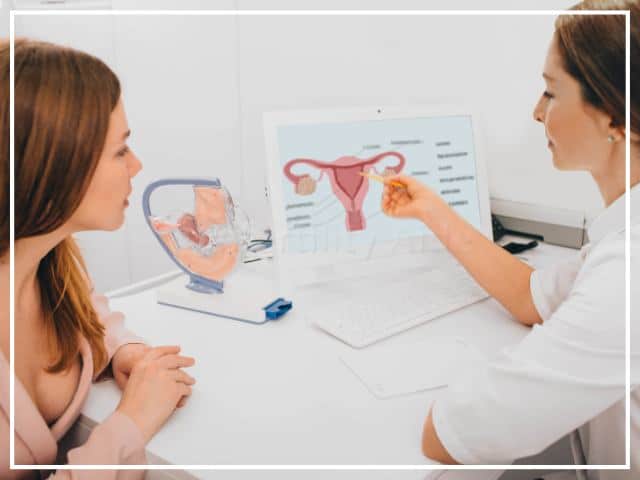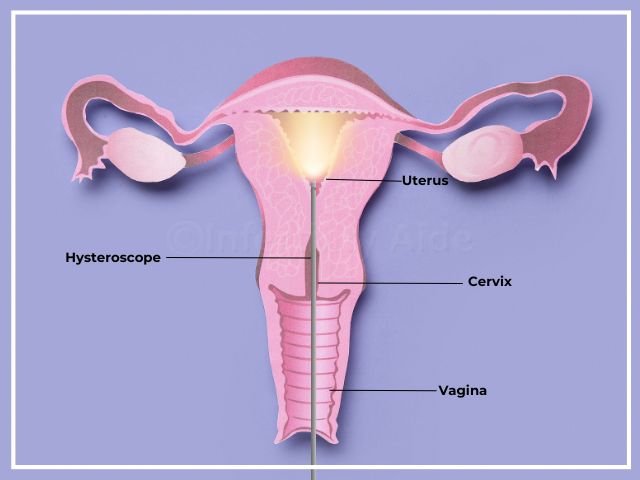Some fertility clinics recommend hysteroscopy to all patients before starting IVF but for you it means an additional expense of upto $5,000. Do you really need a hysteroscopy before IVF? Does hysteroscopy help in improving IVF success?
Many studies have failed to associate hysteroscopy and IVF success so it is certainly not an absolute requirement in all women, but in some cases this procedure could be important.
Here we enlist the situations when hysteroscopy before IVF is actually recommended.
What is hysteroscopy?
Hysteroscopy is a medical procedure that allows your doctor to diagnose, examine, and treat issues in your uterus. A thin, lighted tube called a hysteroscope is inserted into the uterus, which allows the doctor to check the uterine cavity for any abnormalities such as polyps, fibroids, adhesions, or other structural problems.
Any abnormal growths can also be removed with the same procedure at the same time with precision and minimal invasiveness.

Why is hysteroscopy done?
- Diagnostic Purpose: Hysteroscopy can help identify the cause of abnormal bleeding, recurrent miscarriages, and check for polyps, fibroids, or other adhesions. the healthcare provider can take a biopsy (a small tissue sample) for further examination, helping to determine the nature of any abnormal growth or lesion.
- Operative Purpose: Small polyps or fibroids, which sometimes are the cause of infertility, can often be removed during hysteroscopy, intrauterine adhesions can be released and uterine septum dividing the uterus can also be corrected.
The diagnosis of intrauterine problems and their treatment before embryo implantation helps optimize the uterus for receiving an embryo, thus improving the chances of a successful implantation and reducing the possibility of miscarriages.
It is a minimally invasive procedure that can be performed on an outpatient basis without requiring any hospital stay.
For patients with possible uterine issues, there are some obvious benefits of doing a hysteroscopy in IVF but it is not required for all patients.
Do you need hysteroscopy before IVF?
The decision to perform hysteroscopy before IVF depends on your specific circumstances. Below are some situations where hysteroscopy may be considered:
- Uterine Abnormalities: If you have already been diagnosed with any uterine growths or structural abnormalities such as fibroids, polyps, or endometritis, you may want to have them rechecked before IVF.
- Adhesions (Asherman’s Syndrome): Any previous infection, D&C, or uterine surgery can cause scarring or adhesions in the uterus, which is known as Asherman’s syndrome. If you have any such medical history, hysteroscopy may be beneficial.
- Recurrent Pregnancy Loss: In cases of multiple miscarriages, hysteroscopy may help investigate and address the potential uterine factors that could be a contributing factor.
- Unexplained Infertility: When the initial fertility evaluations do not reveal any particular cause of infertility, hysteroscopy may be done to assess the uterine environment before starting IVF.
When is the best time to have hysteroscopy?
The best time to have a hysteroscopy depends upon the specific goals of the procedure, your own fertility treatment plan, and any underlying medical conditions. Here are some scenarios that might dictate the timing of hysteroscopy:
- Pre-IVF evaluation: As part of your IVF treatment, hysterectomy is ideally performed in the cycle preceding the IVF treatment cycle to allow time for any necessary interventions or treatments.
- Following diagnostic tests: Depending on the findings of your other diagnostic tests, such as hysterosalpingography (HSG), hysteroscopy can be scheduled immediately after those tests.
- During mock embryo transfer: To assess your uterine cavity, some clinics do a mock embryo transfer before the actual procedure, and hysteroscopy is often included.
- Before frozen embryo transfer (FET): If you have stored embryos from a previous IVF cycle, hysteroscopy may be performed before the frozen embryo transfer.
It’s important to note that the timing may vary based on individual circumstances, and the decision should be made in consultation with a fertility specialist.
What to expect during hysteroscopy?
1. Preparation: You will be required to avoid eating or drinking anything on the day of, or even the night before your hysteroscopy.
2. Positioning: In the doctor’s office, you will be asked to lie on your back with your feet placed in stirrups, similar to a pelvic examination.
3. Anesthesia: A local anesthetic will be applied, to numb the cervix area. If surgical part is expected or planned, regional or general anesthesia may be administered.
5. Dilating the Cervix (if necessary): If required, the cervix may be dilated a little to allow the hysteroscope to pass through.
6. Insertion of the hysteroscope: The hysteroscope—a flexible tube with light and camera—is inserted into the uterus and liquid solution or CO2 gas is then introduced to expand the uterine cavity, so it is easier to see.
7. Visual examination and potential intervention: Your uterus and fallopian tubes will be visually assessed by the doctor and any abnormalities can be detected and corrected at this stage. The hysteroscope is then removed
8. Recovery: You may experience mild discomfort, spotting, and cramping after the procedure but will be allowed to go home and resume normal activities.
9. Follow-up: Your doctor will discuss the findings with you after the procedure and provide any necessary recommendations for follow-up care or additional treatments.

How long after hysteroscopy can you do an embryo transfer?
If any surgical procedures are performed during hysteroscopy, it is normally advised to wait for 4-6 months for embryo transfer to allow your uterine cavity to heal.
However, a study of women who had hysteroscopic polypectomy before FET (1), found no difference in outcomes between those who waited for a month after hysterectomy and those who waited for three or months before FET.
If you only have a diagnostic hysteroscopy or one with minor interventions, your doctor may even do hysteroscopy and IVF in the same cycle without significantly impacting the timeline.
What day of my cycle is hysteroscopy done?
Depending upon the goals of your hysteroscopy it may be scheduled sometime between day 5-14 of your cycle, when the endometrium is thin, so the doctor can get a clear view.
Risks and complications associated with hysteroscopy
- Infection: All surgical procedures carry the risk of infection but this risk is minimized by maintaining sterile conditions during the procedure.
- Uterine perforation: There is a potential risk of causing perforation in the uterus, even though it is not common. Make sure to have the procedure done by an experienced and skilled practitioner to avoid any risk of injury.
- Adverse reaction to anesthesia: There is a risk of adverse reaction to general anesthesia but this risk is low and a skilled team should be able to avoid it.
- Bleeding: Minor spotting is expected and some bleeding may occur if you had any operative procedures like myomectomy or but if you have excessive bleeding, contact your physician immediately.
- Post-operative pain and discomfort: Mild to moderate pain after the procedure is expected and can be usually managed with medications. Excessive pain could be a sign of some complication and must be immediately reported.
Other than this, there is always a risk of missed diagnosis, when not all uterine abnormalities are identified during hysteroscopy.
Do you need hysteroscopy before IVF?
In a retrospective study of 292 women, who attended a clinic for IVF treatment, the doctors found that 74 (25 percent) of them had some intrauterine pathology, which when corrected with hysteroscopy, resulted in a considerable improvement in pregnancy rate.
While the researchers in this study insist that examining the uterine cavity is an important step before IVF, it does not justify the need of an invasive hysteroscopy in every patient.
Does hysteroscopy help improve IVF success rates?
A much larger study funded by the Dutch Organization for Health Research and Development (ZonMW)(2), involved over 750 women, of which half were assigned to undergo hysteroscopy while the other half went straight to IVF.
In the women eligible for hysteroscopy, 209 out of 369 (or 57%) successfully conceived and had a live birth, while among the women who went straight to IVF, 200 out of 373 (or 54%) were able to have a livebirth.
One (<1%) woman also developed endometritis after hysteroscopy.
The researchers concluded that routine hysteroscopy before IVF does not improve the treatment outcome, hence, it is not recommended.
Another study in 2019 found that women having recurrent implantation failure after IVF also did not benefit from hysteroscopy(3). While, the implantation rates in these women improved, and they were able to get pregnant, there was no improvement in live birth.
Are there any alternatives to hysteroscopy before IVF?
There are less invasive techniques like transvaginal ultrasound of the uterine cavity, which can be done to check the insides of your uterus and be followed up with an operative hysteroscopy, only if any problem is found.
Should I get hysteroscopy before IVF?
A study of 765 patients(4), who had IVF treatment between January 2015 and July 2017, found that hysteroscopy before fresh or frozen embryo transfer did not improve pregnancy rates. Hysteroscopy in these patients was performed by the same experienced surgeon and scheduled two months before transfer.
However, researchers of a different study(5) found that screening hysteroscopy may increase clinical pregnancy rates in women, who had normal TVS findings, good quality embryos, but still failed their first attempt at IVF.
So, if you understand the cause of your infertility isn’t related to a problem in the uterine cavity, a routine hysteroscopy before IVF may seem like an unnecessary trouble and expense for the patient.
If your doctor/clinic insists, don’t hesitate to get a second opinion to check if hysteroscopy is really required in your situation. If, however, you have any uterine growths that make it obligatory, do not hesitate to go through with it.
Learn more about hysteroscopy and IVF and get expert advice and second opinions from some of the most experienced fertility experts in the world. For more information, get in touch via the form on this page.
References
- Wang, B., Meng, N., Zhang, W., Kong, P., Liu, Z., Liu, W., Sun, H., Zhang, W., Ren, C., & Guan, Y. (2022). Optimal waiting period for frozen embryo transfer after hysteroscopic polypectomy: A propensity score matching analysis. Frontiers in endocrinology, 13, 986809. https://doi.org/10.3389/fendo.2022.986809
- Smit, JG, Kasius, JC, Eijkemans M … Torrance H L (2016). Hysteroscopy before in-vitro fertilisation (inSIGHT): a multicentre, randomised controlled trial. Lancet (London, England), 387(10038), 2622–2629. https://doi.org/10.1016/S0140-6736(16)00231-2
- Mao, X., Wu, L., Chen, Q., Kuang, Y., & Zhang, S. (2019). Effect of hysteroscopy before starting in-vitro fertilization for women with recurrent implantation failure: A meta-analysis and systematic review. Medicine, 98(7), e14075. https://doi.org/10.1097/MD.0000000000014075
- Eserol, F., Göksever Çelik, H., Aytan, A. N., Çelik, A., Çelik, E., Buyru, F., & Bastu, E. (2021). The effect of diagnostic hysteroscopy performed before fresh and frozen-thawed embryo transfer in IVF cycles on reproductive outcomes. Journal of the Turkish German Gynecological Association, 22(3), 206–211. https://doi.org/10.4274/jtgga.galenos.2021.2020.0136
- Zikopoulos, A., Galani, A., Siristatidis, C., Georgiou, I., Mastora, E., Paraskevaidi, M., Zikopoulos, K., & Kolibianakis, E. (2022). Is Hysteroscopy Prior to IVF Associated with an Increased Probability of Live Births in Patients with Normal Transvaginal Scan Findings after Their First Failed IVF Trial?. Journal of clinical medicine, 11(5), 1217. https://doi.org/10.3390/jcm11051217